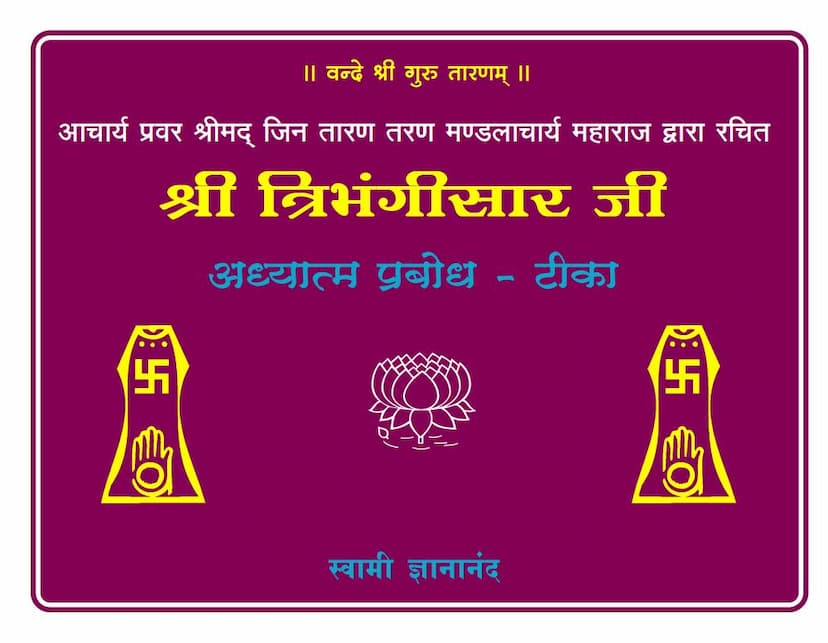Tribhangi Sara
Added to library: September 2, 2025

Summary
This document is a Jain text titled "Tribhangi Sara," authored by Gyanand Swami and published by Taran Taran Sangh Bhopal. It is a commentary and spiritual discourse on the original work by Acharya Shrimad Jin Taran Taran Mandalacharya.
Core Subject:
The "Tribhangi Sara" (meaning "essence of the three-part structure") is a foundational text within the Taranpanth tradition of Jainism. It focuses on the core spiritual teachings and practices for achieving liberation (moksha). The commentary by Swami Gyananand aims to make these complex spiritual concepts accessible in a simpler, more understandable language.
Key Themes and Content:
- The Teachings of Acharya Jin Taran Taran: The book extensively discusses the life, philosophy, and works of Acharya Jin Taran Taran, a significant figure in Jainism known for his emphasis on pure soul (shuddhatma) and spiritual revolution. His teachings are described as revolutionary, aimed at freeing people from rituals, superstitions, and external worship, focusing instead on inner spiritual realization.
- Asrava and Samvara: A central theme is the understanding and control of asrava (inflow of karmas) and the practice of samvara (cessation of karma inflow). The text meticulously explains the various causes and types of asrava, often categorized into "tribhangis" (three-part divisions) and their numerous sub-categories (108 types of asrava are mentioned). It then elucidates the practices and principles of samvara that lead to the cessation of karmic bondage.
- The "Tribhangis" (Three-Part Divisions): The title itself refers to the concept of "tribhangis," which are fundamental divisions and analyses of spiritual concepts. The first chapter details the 36 tribhangis that lead to asrava, resulting in 108 distinct negative karmic inflows. The second chapter focuses on the practices that lead to the cessation of asrava and the attainment of samvara (also presented in "tribhangi" structures).
- The Path to Liberation: The text emphasizes that the true path to liberation lies in understanding one's pure soul (shuddhatma) and focusing on its inherent qualities. This involves discrimination between the self (soul) and non-self (body, karma, external objects), detachment from worldly pleasures and attachments, and the cultivation of pure thought, speech, and action.
- Spiritual Practices: The commentary highlights various spiritual practices and philosophical concepts crucial for liberation, including:
- Right Faith (Samyakdarshan): Correct belief in the true nature of the soul and the universe.
- Right Knowledge (Samyakgyan): Accurate understanding of spiritual principles and the self.
- Right Conduct (Samyakcharitra): Living according to spiritual principles, which includes the renunciation of impure thoughts, speech, and actions.
- The Fivefold Divisions (Matas): The text categorizes Taran Swami's fourteen works into five divisions: Vichar Mat, Achar Mat, Sar Mat, Mamal Mat, and Keval Mat, each focusing on different aspects of spiritual practice and realization.
- Yoga and Meditation: The commentary references the Taranpanth tradition's emphasis on specific yogic practices, including the "Shatkamal" (six lotus centers) and associated "Arka" meditations, as a means to achieve spiritual advancement and control over bodily and mental functions.
- The Importance of Pure Thoughts: The text stresses that thoughts are the root cause of karma bondage. Pure thoughts lead to liberation, while impure thoughts (fueled by attachment, aversion, ego, etc.) lead to continued cycles of birth and death.
- Critique of External Rituals: A significant aspect of the Taranpanth philosophy, reflected in this text, is the critique of elaborate external rituals and superstitions that do not lead to inner transformation. The focus is consistently on cultivating inner purity and self-realization.
- The Role of the Commentator: Swami Gyananand's commentary is praised for its clarity and ability to explain profound spiritual concepts in simple, accessible language, making the teachings of Acharya Taran Taran available to a wider audience.
Overall Message:
"Tribhangi Sara," through its insightful commentary, serves as a guide for Jains seeking spiritual liberation. It advocates for a path of self-inquiry, detachment, and the cultivation of pure soul consciousness by understanding the inflow and cessation of karmas, ultimately leading to the attainment of the pure, liberated soul.